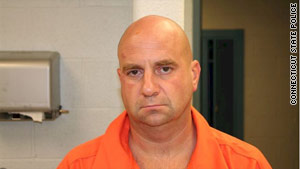Scammer
Banned

The sentencing phase in the trial of Steven Hayes, who was convicted of killing a mother and her two daughters during a brutal 2007 Connecticut home invasion, gets underway Monday.
Hayes, 47, could face the death penalty.
Earlier this month, he was found guilty of 16 of the 17 charges against him in connection with the deaths of Jennifer Hawke-Petit and her two daughters, including nine counts of murder and capital murder and four counts of kidnapping. Jurors acquitted him of an arson charge.
The killings took place in the New Haven, Connecticut, suburb of Cheshire early on July 23, 2007. The brutal nature of the attack shocked the well-to-do community and immediately drew nationwide attention.
William Petit, whose wife and two daughters were murdered, has said he will not testify during the sentencing phase of the trial. Petit said he "regretfully decided" against it because Connecticut's law on victim impact statements is unclear and could provide convicts with grounds to appeal their sentences.
During the penalty phase, jurors will determine whether the mitigating evidence the defense is expected to present outweighs the aggravating factors in favor of the death penalty.
Judge Jon Blue has suggested the penalty proceeding could last as long as four weeks, though the relatively quick pace of the guilt phase of Hayes' trial has led some to speculate the penalty phase could also be quick.
Jurors are allowed to consider evidence they heard during the guilt phase of the trial. They can also consider new testimony or evidence that attorneys introduce during the sentencing phase -- which might include the defendant's long history of prior convictions and anything that casts Hayes in a positive light.
Hayes himself could testify.
His attorneys had sought to introduce testimony regarding the comparative cost of life imprisonment versus execution -- something Judge Blue ruled against.
Petit and his wife's home was invaded in the middle of the night by Hayes and another man, Joshua Komisarjevsky, prosecutors say. Komisarjevsky will be tried separately.
Connecticut State Police Detective Anthony Buglione, who interviewed Hayes after the crime, has testified that the duo beat Petit bloody and left him in the basement.
According to testimony, the two men then went upstairs and found Hawke-Petit and 11-year-old Michaela Petit asleep in the master bedroom. After tying Hawke-Petit to her bed, they led the girl to her room, tied her to her bed and put a pillowcase over her head, Hayes told Buglione.
They then found 17-year-old Hayley Petit in her room and did the same, he said.
After finding evidence of a bank account containing $20,000 to $30,000, they decided to have the mother go to the bank in the morning and withdraw money from her account, Buglione testified.
Hayes is accused of taking Hawke-Petit to the bank while Komisarjevsky allegedly stayed behind. When Hayes and Hawke-Petit returned with the money, the two men allegedly set the home on fire and fled.
Inside the home, authorities said, Hawke-Petit, 48, was found raped and strangled. Her two daughters, one of whom had been sexually assaulted, died of smoke inhalation. Petit, the sole survivor, escaped to a neighbor's home.
"There is some relief, but my family is still gone," Petit told reporters soon after the jury's guilty verdict. "It doesn't bring them back. It doesn't bring back the home that we had."
